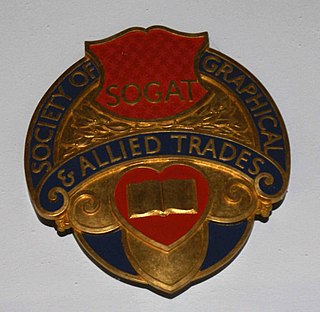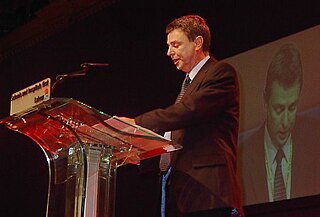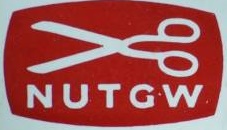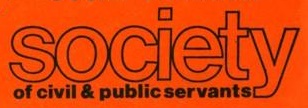Related Research Articles
The Christian Social Union (CSU) was an organisation associated with the Church of England, with some similar features to the Social Gospel movement of North America. The group was established in 1889 and dedicated itself to the study of contemporary social conditions and the remedying of poverty and other forms of social injustice through public mobilisation to alleviate the same. The organisation was terminated by merger in 1919, becoming part of the Industrial Christian Fellowship (ICF).

The Public and Commercial Services Union (PCS) is the sixth largest trade union in the United Kingdom. Most of its members work in UK government departments and other public bodies.

The Society of Graphical and Allied Trades (SOGAT) was a British trade union in the printing industry.

The NASUWT is a TUC-affiliated trade union representing teachers, including headteachers, throughout the United Kingdom.

Rodney Kevan Bickerstaffe was a British trade unionist. He was General Secretary of the National Union of Public Employees (1982–1993) and UNISON (1996–2001), Britain's largest trade union at the time. He later became president of the UK National Pensioners Convention (2001–2005).

The National Union of Public Employees (NUPE) was a British trade union which existed between 1908 and 1993. It represented public sector workers in local government, the Health Service, universities, and water authorities.

David Prentis is a British trade unionist and former General Secretary of UNISON, the United Kingdom's largest trade union. He was originally elected in 2000. He was re-elected in March 2005, with 77% of the vote, in 2010, and in 2015.

The Amalgamated Engineering Union (AEU) was a major British trade union. It merged with the Electrical, Electronic, Telecommunications and Plumbing Union to form the Amalgamated Engineering and Electrical Union in 1992.
Peter Nedergaard is a Danish professor of political science who has been employed at the Department of Political Science at the University of Copenhagen since 2008. Peter Nedergaard is member of the Order of Dannebrog.

The National Union of Tailors and Garment Workers (NUTGW) was a trade union in the United Kingdom.

The National Union of Civil and Public Servants (NUCPS) was a trade union in the United Kingdom.

The Trades Union Congress (TUC) is a national trade union centre, a federation of trade unions in England and Wales, representing the majority of trade unions. There are 48 affiliated unions, with a total of about 5.5 million members. The current General Secretary is Frances O'Grady.
John Denby Sheldon is a British trade unionist and former General Secretary of the Public and Commercial Services Union, and its predecessors; NUCPS, PTC and the CSU.

The Institution of Professionals, Managers and Specialists (IPMS) was a trade union representing managers and other people with professional qualifications in the United Kingdom, with a majority of members working in the civil service.

The Society of Civil and Public Servants (SCPS) was a trade union representing middle-ranking civil servants in the United Kingdom.
William Leslie Kendall was a British trade unionist.
The GCHQ trade union ban was a ban on trade union membership of employees at the Government Communications Headquarters in Cheltenham between 1984 and 1997. This was based on the claim by the Conservative government that it undermined national security. It sparked a dispute which became a cause célèbre, one of the most important trade union issues of the 1980s and the second longest continuously fought dispute in British trade union history.

The All India Services Act, 1951 is an Indian legislation. The Act established two All India Services and provides for the creation of three more.

Dame Geraldine Maitland Aves, DBE was a British civil servant, United Nations advisor on welfare, and social reformer.
References
- 1 2 3 Marsh, Arthur (1984). Trade Union Handbook (3 ed.). Aldershot: Gower. pp. 159–160. ISBN 0566024268.
- ↑ "Records of the Civil Service Union" (PDF). Modern Records Centre, University of Warwick. 9 June 2009. Archived from the original (PDF) on 4 March 2016. Retrieved 19 April 2013.
- 1 2 "Trade union family trees - Public and Commercial Services Union" (PDF). Trade Union Ancestors. 23 September 2007. Archived from the original (PDF) on 17 December 2010. Retrieved 26 September 2010.
- ↑ Lowe, Rodney (2011). The Official History of the British Civil Service: Reforming the. Vol. 1, The Fulton Years, 1966–1981. Abingdon: Routledge. p. 283. ISBN 0-203-83155-1 . Retrieved 19 April 2013.
- ↑ Lowe, Rodney (2011). The Official History of the British Civil Service: Reforming the. Vol. 1, The Fulton Years, 1966–1981. Abingdon: Routledge. p. 296. ISBN 0-203-83155-1 . Retrieved 19 April 2013.
- ↑ Lowe, Rodney (2011). The Official History of the British Civil Service: Reforming the. Vol. 1, The Fulton Years, 1966–1981. Abingdon: Routledge. p. 284. ISBN 0-203-83155-1 . Retrieved 19 April 2013.
- 1 2 3 4 5 6 7 8 9 10 11 12 13 Edwards, Kathleen L. (1975). The Story of the Civil Service Union. London: George Allen and Unwin.
- ↑ Lowe, Rodney (2011). The Official History of the British Civil Service: Reforming the. Vol. 1, The Fulton Years, 1966–1981. Abingdon: Routledge. p. 287. ISBN 0-203-83155-1 . Retrieved 19 April 2013.
- ↑ Kandiah, Michael; Lowe, Rodney, eds. (2007). "The Civil Service Reforms of the 1980s" (PDF). Centre for Contemporary British History. p. 22.